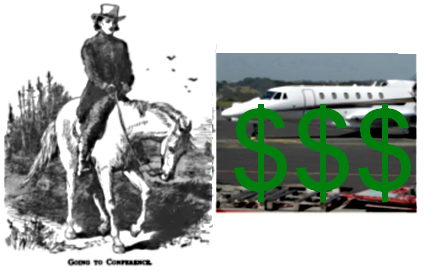Portrait of a Revival Preacher
Remember the tale of the four blind Ethiopians who overtook an elephant? The groping men started to explain what they had encountered:
“Oh!” said the first. “We are on the brink of a well. I have caught the rope hanging over the rim of it.” Thus spake the man who held onto the tail of the monster.
“Nonsense,” said the enlightened commentator at the other end of the beast. “We are at the peril of a great snake. He has just moved his slimy head across my legs.” So much for the trunk of the beast.
“You are both wrong,” declared the third witness. “We are in a low cave. I have just reached up and touched the low roof.” It happened he was tickling the wrinkled abdomen of the mammoth.
“Fools!” cried the last man as he held his arms around the leg of the animal. “We are in a forest. I have my arms around a tree.”
It seems to me that the critics down the ages have been almost as confused in their evaluation of John Wesley as were the blind Ethiopians with their elephant.
Dr. Maximinim Piette, the Roman Catholic professor at Brussels, Belgium, terminating his classic work on John Wesley, says Wesley has been compared to:
“Saint Benedict as regards his l i t u r g i c a l sense of piety; Saint Dominic for his apostolic zeal; Saint Francis of Assisi for his love of Christ and for his detachment from the world; Ignatius of Loyola for his genius as an organizer.”
The distinguished political leader and man of letters Augustine Birrel does not hesitate to call John Wesley “the greatest force of the eighteenth century.”
Canon J. Overton, the Anglican historian, might be charged with being a little biased in his view of his fellow Anglican, but he rates Wesley as “the busiest, and in some respects, the most important life in that century.”
Dr. T. R. Glover, the Public Orator Emeritus of Cambridge University, England, places Wesley with Paul, Augustine, and Luther, thus ranking him with the greats of the evangelical succession.
As I see it, Wesley might have been the Prime Minister of England had he turned his genius into political channels. He might have forestalled many of the later inventors had he applied himself to the tricks of science. His bank balance at death might have been like that of a Rothschild had he devoted his gifts to the unrighteous mammon.
Peep for a moment at the antecedents to John Wesley’s conversion. His diary gives these illuminating facts:
“In the year 1725, being in the 23rd year of my age, I met with Bishop Taylor’s Rules and Exercises of Holy Living and Dying. I was exceedingly affected. I resolved to dedicate my life to God. A year or two after Mr. Law’s Christian Perfection was put into my hands. This convinced me more than ever of the impossibility of being half Christian. And I am determined, through His grace (the absolute necessity of which I was deeply sensible) to be all devoted to God – to give Him all my soul, my body and my substance.”
Despite this startling word from his own pen, plus the fact that this good soul rose at four a.m. to pray, besides giving alms and devotedly caring for the poor – yet he owns to having no witness of the Spirit that he was born of God.
About midnight on the 24th of August, 1709, while he was not yet six years of age, John Wesley was dramatically saved from his burning home. On the 24th of May, 1738, mature, educated, self-disciplined, and virtuous by any standard, Wesley was saved again. About a quarter to nine on that memorable night, John Wesley’s heart was strangely warmed, and because of that, the world has been warmer ever since.
As a brand plucked from the burning, Wesley went forth to pluck other brands from eternal burnings. The dignified, dapper Oxford don saddled his mare and with eager pity sought the “erring children, lost and lone.”
Darkness covered England and gross darkness her people when Wesley, along with Whitefield, picked up the torch of Biblical regeneration to light her thickest gloom.
Bishops Butler and Berkley have been called the best churchmen of their day; nevertheless Butler forbade Wesley and Whitefield to preach in his diocese although it was thronged with some of the most degraded folk in the kingdom.
There were ministers with hearts aflame in other parts of England at the time, notably Grimshaw of Haworth. William Law was Wesley’s contemporary theologian at the same time that Charles Wesley, Phillip Dodderidge, and Isaac Watts were putting divine fire into music and setting spiritual truth to song.
It amazes me that the Lord took the tender and scholarly Wesley to the outcasts of men and then took Whitefield from the tavern atmosphere where he was raised to evangelize the elite in their silks and satins.
Wesley as a preacher is described in a paragraph I often read from the pen of an unknown author:
“Take thy liberty; occupy thy commission, wound and heal; break down and build up again. Be fettered by no times; accommodate no man’s conveniency; spare no man’s prejudice; yield to no man’s inclinations though thou scatter all thy friends and rejoice all thine enemies. Preach the gospel: not the gospel of the last age or of this age, but the everlasting gospel.”
I believe that this is just what Wesley did.
Wesley probably lacked both the oratory and some of the fire of Whitefield, but no one has ever seriously questioned his anointing. Wesley had power, and under his preaching men were slain of the Lord. Even the boisterous Whitefield was alarmed at this, but he was more alarmed when within days, the same phenomena attended his own meetings.
John Wesley preached with revelation. “His spiritual insight was hardly less than terrible. He seemed to see into men’s souls, to put his finger upon the hidden sin, the unconfessed fear.”
In the main, the unchurched people loved to hear him. In nine months he delivered at least five hundred sermons, and only six of them were in churches.
Mr. Wesley did preach second-blessing holiness. Hear him in writing to Joseph Benson: “With all zeal and diligence confirm the brethren (1) in holding fast that whereto they have attained – namely, remission of all their sins by faith in the bleeding Lord, and (2) in expecting a second change, whereby they shall be saved from all sin and perfected in love.”
To Sarah Rutter he writes: “Gradual sanctification may increase from the time you are justified, but full deliverance from sin, I believe, is always instantaneous – at least, I never knew an exception.”
Space forbids more about this flaming apostle. Let me conclude with Dr. W. H. Fitchett’s words on this God-possessed soul:
“He seemed to live many lives in one, and each life was of an amazing fulness. He preached more sermons, traveled more miles, published more books, wrote more letters [without a secretary], built more churches, waged more controversies, and influenced more lives than any other man in English history. And through it all, as he himself in a humorous paradox puts it, he had not time to be in a hurry.”
John Wesley was “a good man, full of faith and of the Holy Ghost.”
By Leonard Ravenhill






